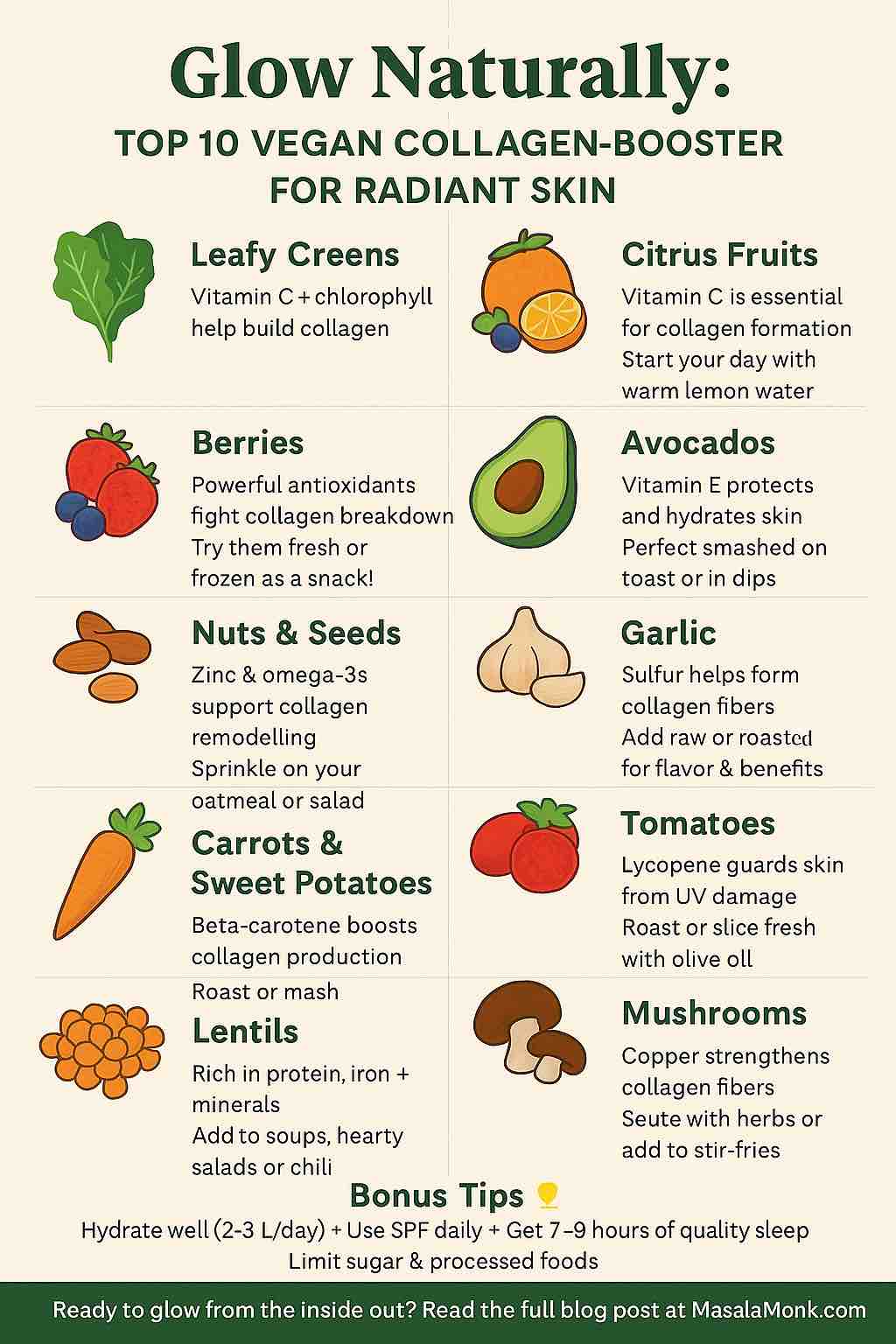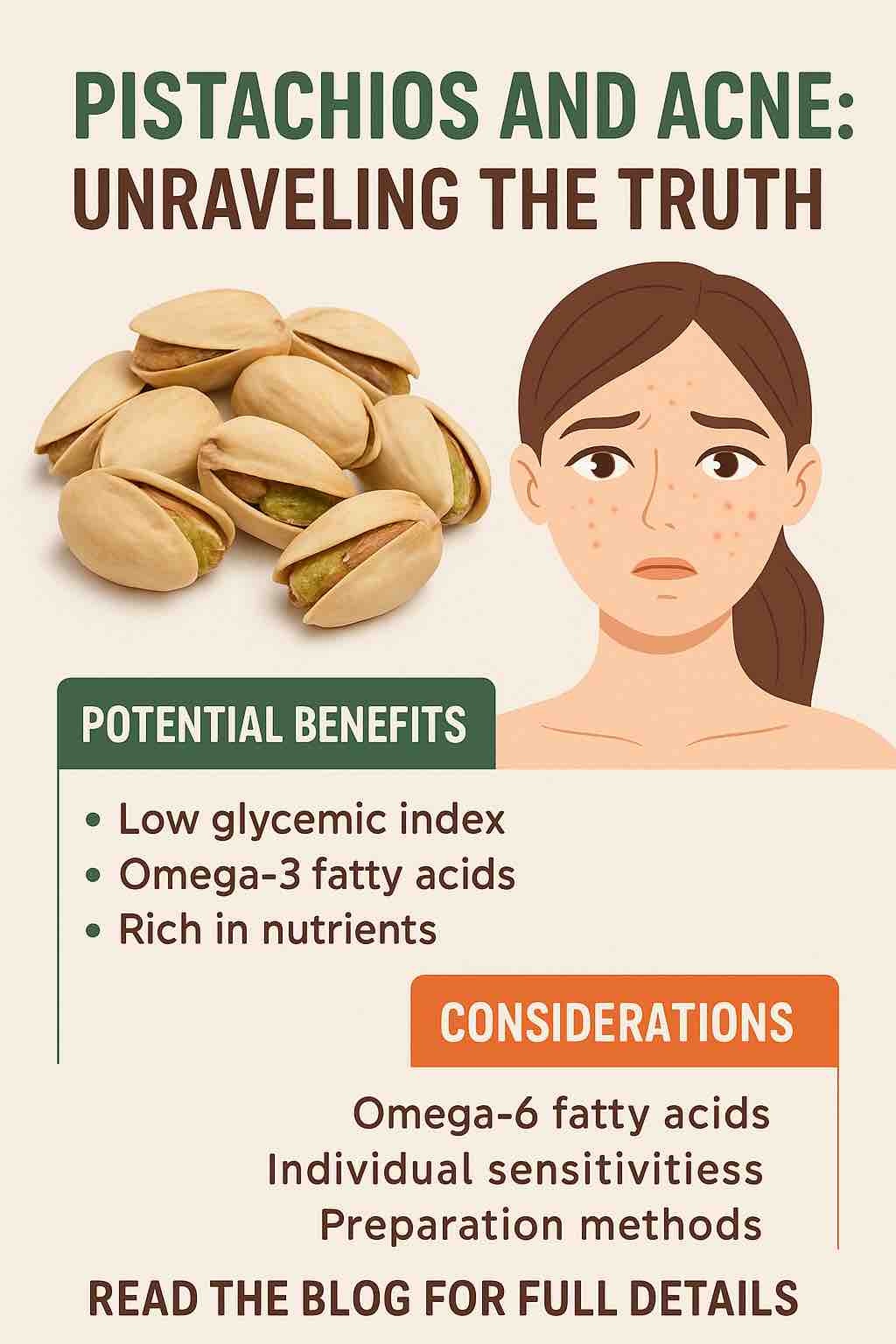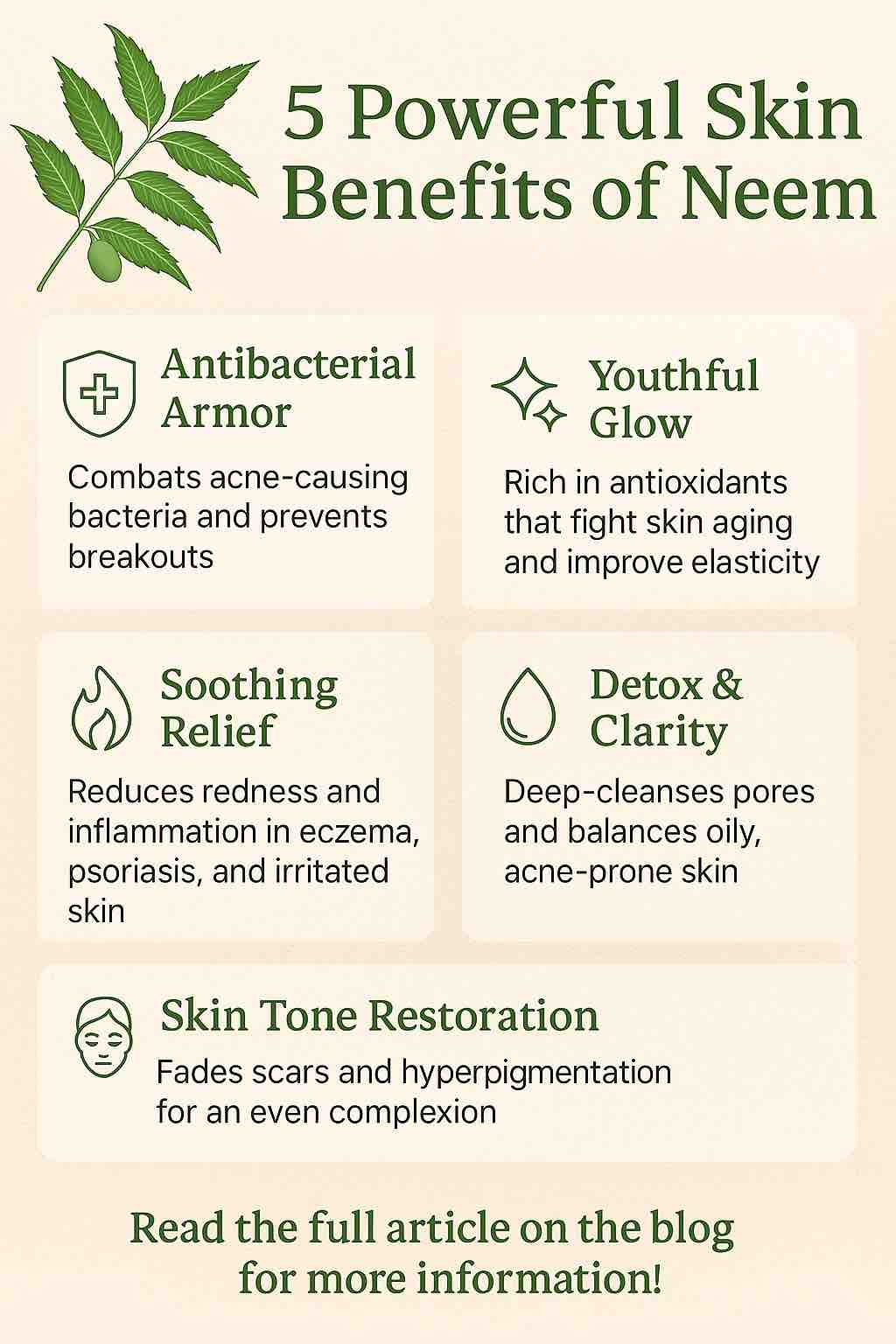
Glow Naturally with These Vegan Collagen-Boosters
When we think of collagen, images of bone broth and collagen powders often come to mind. But what if you follow a plant-based lifestyle or simply prefer to get your glow from greens? Good news: you can stimulate your body’s collagen production naturally—with plants.
Collagen itself is an animal-derived protein, but your body can synthesize it using certain amino acids, vitamins, and minerals. A whole-food, plant-based diet can provide all the necessary co-factors to stimulate collagen synthesis and protect existing collagen from degradation.
Let’s dive into the top 10 plant-based foods that naturally boost collagen production and support firm, radiant, youthful skin.
🥬 1. Leafy Greens – The Chlorophyll Champions
Why they help:
Spinach, kale, Swiss chard, and arugula are loaded with vitamin C, vitamin A, magnesium, and chlorophyll. Vitamin C is essential for converting proline into hydroxyproline—a key step in collagen production. Chlorophyll may also increase precursor molecules for collagen.
How to enjoy them:
- Blend into green smoothies
- Sauté with garlic and olive oil
- Add raw to salads and wraps
🍊 2. Citrus Fruits – Vitamin C Powerhouses
Why they help:
Collagen cannot form without vitamin C. It helps link amino acids like glycine and proline to form procollagen—the first stage of collagen synthesis.
Best choices: Oranges, lemons, limes, grapefruit, tangerines.
How to enjoy them:
- Start your day with warm lemon water
- Add orange slices to salads
- Make a citrus vinaigrette
🍓 3. Berries – Antioxidant Armor
Why they help:
Strawberries, blueberries, raspberries, and blackberries are antioxidant-rich fruits that fight free radicals—one of the primary causes of collagen breakdown. They also contain vitamin C in abundance.
Bonus: Strawberries actually contain more vitamin C per gram than oranges!
How to enjoy them:
- Top them on oats or yogurt
- Blend into smoothies
- Freeze for a cold summer treat
🥑 4. Avocados – Skin-Softening Superstars
Why they help:
Avocados are rich in vitamin E, a fat-soluble antioxidant that protects collagen from oxidative damage. They also contain healthy fats that support skin hydration and elasticity.
How to enjoy them:
- Smash into toast
- Slice over buddha bowls
- Blend into creamy dips and smoothies
🌰 5. Nuts & Seeds – Collagen-Supporting Essentials
Why they help:
Walnuts, chia seeds, flaxseeds, and almonds are high in omega-3 fatty acids, zinc, and vitamin E—all crucial for collagen protection and synthesis. Zinc in particular plays a role in collagen remodeling.
How to enjoy them:
- Sprinkle on salads or smoothies
- Mix into granola or overnight oats
- Make your own trail mix
🧄 6. Garlic – The Sulfur-Rich Secret
Why it helps:
Garlic contains sulfur, which is vital for the formation of disulfide bonds in collagen fibers. It also includes taurine and lipoic acid, compounds that repair damaged collagen.
How to enjoy it:
- Use raw in dips like guacamole or hummus
- Roast whole garlic heads for a mellow, spreadable treat
- Add to stir-fries, soups, or salad dressings
🍅 7. Tomatoes – Lycopene-Loaded Collagen Protectors
Why they help:
Tomatoes are rich in lycopene, a potent antioxidant that helps protect skin from UV damage, one of the biggest contributors to collagen loss. They also contain vitamin C.
How to enjoy them:
- Roast cherry tomatoes with herbs
- Blend into sauces
- Slice fresh with olive oil and sea salt
🥕 8. Carrots & Sweet Potatoes – Vitamin A Amplifiers
Why they help:
These orange veggies are high in beta-carotene, which the body converts to vitamin A. Vitamin A helps activate fibroblasts, the cells responsible for producing collagen.
How to enjoy them:
- Roast with olive oil and rosemary
- Blend into soups or stews
- Grate into wraps or salads
🫘 9. Beans & Lentils – Plant Protein with a Purpose
Why they help:
Beans (like black beans, chickpeas, and kidney beans) and lentils are rich in protein, zinc, and copper—key nutrients your body uses to build collagen.
How to enjoy them:
- Make lentil soups or bean chili
- Add chickpeas to grain bowls
- Try roasted chickpeas for a crunchy snack
🍄 10. Mushrooms – The Copper Connection
Why they help:
Mushrooms (especially shiitake and maitake) contain copper, which is essential for the cross-linking of collagen fibers. Copper activates an enzyme called lysyl oxidase, crucial for strong collagen structure.
How to enjoy them:
- Sauté with garlic and herbs
- Add to pasta, stir-fries, or tacos
- Use as a meaty plant-based substitute in burgers or stews
💡 Bonus Tip: Lifestyle Habits That Maximize Collagen
Eating the right foods is vital, but collagen also relies on daily habits. For best results, pair your plant-based diet with:
- Adequate hydration (2–3 liters/day)
- Sun protection (use SPF daily)
- Quality sleep (7–9 hours/night)
- Stress management (meditation, yoga, walking)
- Limiting sugar & processed foods, which cause glycation and break down collagen
🧘♀️ Final Thoughts: Your Glow Is Plant-Powered
Collagen might be animal-based, but your skin doesn’t need meat to thrive. With the right plant-based nutrients, you can give your skin the building blocks it needs to glow from the inside out—naturally, ethically, and sustainably.
🌟 Consistency is key. Try incorporating 2–3 of these foods into your daily diet and watch your skin transform over the coming weeks.
📌 Frequently Asked Questions (FAQs)
1. Can a plant-based diet really help boost collagen production?
Yes. While plants don’t contain collagen, they provide the vitamins, minerals, and amino acids necessary to support your body’s natural collagen synthesis.
2. What’s the most important nutrient for collagen production?
Vitamin C is crucial. Without it, your body cannot synthesize or maintain collagen effectively.
3. How long does it take to see skin improvements from collagen-boosting foods?
Typically, visible results appear in 4–8 weeks with consistent dietary changes. Some people notice improvements in skin hydration and elasticity even sooner.
4. Are there any vegan sources of collagen supplements?
Technically, all collagen supplements are animal-derived. However, vegan collagen boosters exist—they contain plant-based ingredients that promote collagen production in your body (e.g., vitamin C, silica, amino acids).
5. Can these foods also benefit hair and nails?
Yes. Collagen supports stronger hair follicles and nail beds, so collagen-stimulating nutrients help improve hair growth and reduce nail brittleness.
6. Do cooking methods affect the collagen-boosting nutrients?
Yes. Overcooking or boiling can destroy heat-sensitive vitamins like vitamin C. For best results, consume some of these foods raw or lightly cooked.
7. What lifestyle habits can enhance collagen production alongside diet?
Stay hydrated, use sun protection, sleep well, reduce sugar intake, and manage stress. These protect and enhance your body’s collagen production.
8. Is it better to eat a variety of collagen-supporting foods or focus on one?
Variety is key. Each food offers different nutrients that contribute to the collagen process—like vitamin C, zinc, copper, and amino acids.
9. Can men benefit from collagen-boosting foods too?
Absolutely. Collagen supports not just skin, but also joints, ligaments, gut health, and muscle recovery—relevant to everyone.
10. Do processed plant-based foods help with collagen?
No. Highly processed foods often lack the nutritional value needed for collagen synthesis and may actually contribute to collagen breakdown due to additives or sugars.













